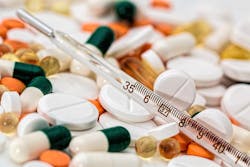Effort to screen potential COVID-19 antiviral drugs underway
Six months into the pandemic, people diagnosed with mild cases of COVID-19 still are told to isolate themselves and wait out the infection at home. Doctors monitor such patients so they can intervene if their condition deteriorates, but no antiviral drugs have been shown to hasten recovery or forestall severe illness in people who are not sick enough to be hospitalized. Consequently, the hunt is still on for compounds that inactivate the COVID-19 virus and have potential to be developed as antiviral drugs.
A first step to finding antiviral drugs – before beginning studies in animals and people – is to screen chemical compounds for their ability to inactivate the virus in a dish. But many researchers do not have access to high-security biosafety labs where they can work with a dangerous microbe like the COVID-19 virus. That is where Jennifer A. Philips, MD, PhD, an associate professor of medicine and co-director of the Division of Infectious Diseases at Washington University School of Medicine in St. Louis, comes in. She has set up a screening platform to test compounds for activity against the COVID-19 virus. Her lab already has screened dozens of compounds suggested by 10 different researchers at Washington University and elsewhere and is prepared to accept more suggestions of promising candidate molecules.
The only antiviral drug authorized by the U.S. Food and Drug Administration (FDA) to treat COVID-19 is remdesivir. The drug, which must be administered by IV, is only recommended for hospitalized patients and shortens the duration of illness by a few days. But many infectious disease experts think that an antiviral drug that could be given earlier in the course of the disease – while the virus is still multiplying rapidly and before a person becomes ill enough to need hospitalization – might be more effective at treating the disease.
Before the pandemic, Philips had not worked with viruses. Her lab focuses on tuberculosis, a bacterial lung infection. Since tuberculosis is a deadly airborne disease, researchers must work with the tuberculosis bacteria in a biosafety level 3 (BSL-3) laboratory, which is an enclosed area with multiple levels of containment and specialized ventilation systems to minimize the risk of exposure. The COVID-19 virus requires the same precautions, but many investigators do not have access to such a facility.
Realizing that she could help fight the pandemic by turning part of her BSL-3 space over to COVID-19 experiments, Philips reached out to Michael S. Diamond, MD, PhD, the Herbert S. Gasser Professor of Medicine and an expert on viral infections, who already was working on COVID-19. Diamond’s lab members trained members of Philips’ lab in basic viral techniques and helped them set up a screening platform for chemical compounds known as small molecules. Now, with support from Washington University’s Institute of Clinical and Translational Sciences, the researchers are offering their services to the biomedical community at Washington University and elsewhere.
To screen compounds, the researchers measure how many animal cells become infected when exposed to the virus, and whether adding the investigational compound reduces the number of infected cells. The researchers also assess whether the compound itself injures animal cells, since such toxicity would make a compound a poor candidate for a drug.
“We’ve found compounds that look promising for further optimization, and they have also now been identified in other screens, which is encouraging,” Philips said. “Given the ICTS funding, we have the capacity to screen more compounds now, so we’re hoping that more people will reach out to us with suggestions. We need to capture the ingenuity of the whole scientific community to defeat this virus.”

